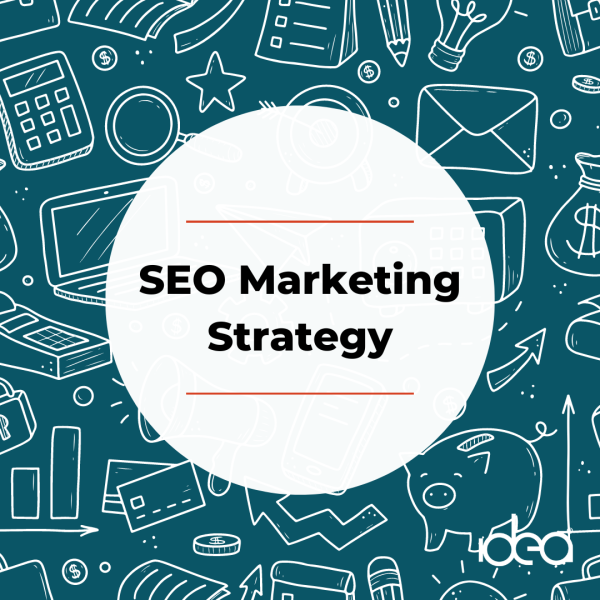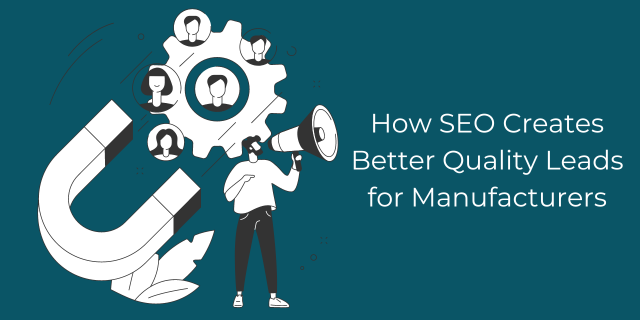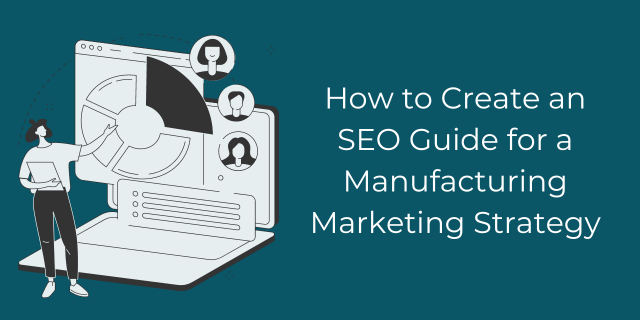SEO Guide for a Better Manufacturing Marketing Strategy
The manufacturing industry still has a lot to learn regarding search engine optimization (SEO), how it works, and why it’s so important. An SEO guide for a better manufacturing marketing strategy would be a game changer for many manufacturers, but many manufacturing professionals put SEO on the back burner or don’t consider it at all.

That’s disappointing since a manufacturing SEO strategy can make or break a company. Every single manufacturer would improve their manufacturing business if they adjusted their manufacturing marketing strategy to include SEO optimization. Fortunately, while SEO is complicated, it is doable!
If you’re one of the manufacturers who still doesn’t see the value in a manufacturing marketing strategy that includes SEO, our SEO guide for a better manufacturing marketing strategy will explain why you should start using it to improve your website and overall business.
Read on to discover how to bring in better leads, improve conversion rates, and increase revenue by leveraging an SEO-based manufacturing marketing strategy.
What is SEO, and Why is SEO Important to a Manufacturing Marketing Strategy?
Before we discuss what makes a top manufacturing strategy we need to fully understand the importance of SEO in a manufacturing marketing strategy. An SEO marketing plan is a combined set of digital marketing practices aimed at improving a website’s visibility through improving its ranking in search engine results pages (SERPs). In general, SEO marketing for manufacturing is a complex topic, and since it is consistently evolving it requires a deep understanding of search algorithms and target audience behavior.
What is an SEO Marketing Strategy?
SEO involves optimizing a website’s content, structure, and technical elements to make it more attractive to search engines. The ultimate goal of SEO is to increase organic traffic to a website by improving its ranking in search results for relevant queries. SEO can be broken down into two main categories: on-page optimization and off-page optimization.
On-page Optimization Is Crucial to A Manufacturing Marketing Strategy
The first part of any SEO strategy is on-page optimization. This optimization refers to optimizing a manufacturing website’s content and structure to make it more valuable to search engine crawlers. Crawlers are what evaluate your website for relevance and your website content needs to be written in a way that takes this into consideration.
When you perform on-page optimization as part of your manufacturing marketing strategy it includes using your targeted keywords in page titles, headings, and content, optimizing meta descriptions and tags, and creating high-quality, engaging content that answers users’ questions and meets their needs.
Your keywords should be the terms or phrases that your target audience is searching for and the specific products or services that are relevant to your business. If you aren’t sure what keywords you should be targeting, then you should make sure to use SEO software and platforms to identify your keyword opportunities. There are some recommended marketing software you can use to help you strategize.
Uncover Keyword Opportunities for Your Manufacturing Marketing Strategy
These opportunities will help your business uncover keywords that you may not have considered before, and that your competitors might not be adequately targeting. This gives you the chance to rank faster and outperform your competition. Keywords change over time, and new phrases can become important, so be sure to reevaluate your keywords at least twice a year.
Once you have completed on-page optimization it’s time for the next part of your manufacturing SEO strategy, off-page optimization. This strategy involves building a website’s authority and credibility through link building, social media marketing, and other digital marketing techniques.
Create Successful Off-page Optimization
Successful off-page optimization should focus on creating high-quality content that other websites are likely to link to, participating in online forums, engaging in influencer marketing, and leveraging social platforms like Google Business Profile.
A Google Business Profile is one of the best channels to drive better SEO results and website traffic. We cover everything your manufacturing business needs to know about leveraging your Google Business Profile in our article Boost Your Google Business Profile to Drive Leads.
Free Marketing ROI Assessment
If you’re struggling to generate digital marketing ROI, our quick survey will show where you can make impactful changes. Understanding why your marketing isn’t working is the first step to fixing it.
Why Should My Manufacturing Marketing Strategy Focus on SEO?
As a manufacturing business, you have a lot to focus on, and you most likely have methods and processes that you’ve used for a long time. But when it comes to marketing, your brand needs to be innovative and leverage the latest tips and techniques to be successful in today’s competitive marketplace.
That is why SEO is a critical part of your manufacturing marketing strategy. Your SEO strategy should be a priority for a number of reasons.
First, SEO as part of your manufacturing marketing strategy helps your manufacturing business reach more of your potential customers by increasing your website’s visibility in search engine results.
Second, it can help manufacturing brands establish themselves as the authorities within their industries by creating high-quality, informative content that answers target audience questions and meets their specific needs.
This helps build both trust and credibility within your target audience, something that is essential to fostering long terms successful client relationships. Trust will drive more lead generation than any magazine ad or digital ad.
Finally, SEO as part of your manufacturing marketing strategy can help manufacturing brands reduce their reliance on paid advertising (PPC Ads) like Google Ads by growing the organic traffic to their website.
Now, we aren’t saying that manufacturing brands should ignore PPC advertising, but it should be used in tandem with your organic marketing efforts. A strong manufacturing marketing strategy that leverages SEO can help reduce your brand’s reliance on PPC ads, reducing your overall cost per lead.
With a strong PPC advertising campaign and optimized SEO strategy, your brand can drive double the traffic for less spend.
How Does SEO Work in a Manufacturing Marketing Strategy?
SEO works by optimizing a manufacturing website’s content and structure to make it more attractive to search engines. Your manufacturing marketing strategy should focus on the following four areas of SEO:
Keyword research: This involves identifying the keywords and phrases that users are likely to use when searching for products, services, or information related to a particular industry or topic.
On-page optimization: This involves optimizing a website’s content and structure to make it more attractive to search engines. This includes using relevant keywords in page titles, headings, and content, optimizing meta descriptions and tags, and creating high-quality, engaging content.
Off-page optimization: This involves building a website’s authority and credibility through link building, social media marketing, and other digital marketing techniques.
Technical optimization: This involves optimizing a website’s technical elements, such as page load times, mobile responsiveness, and site structure, to make it more attractive to search engines.
By following this process, your brand can begin to build a better manufacturing marketing strategy by leveraging SEO. Over time your website rankings will begin to improve and increase your organic website traffic. This will result in quality leads from your target audience if your website is properly optimized for the user journey.

How SEO Creates Better Quality Leads for Manufacturers
Can SEO help improve the quality of my leads? The answer is a resounding Yes! An SEO focus in your manufacturing marketing strategy can absolutely increase and improve the quality of your inbound leads.
When your manufacturing website is optimized for SEO, it has a better chance of ranking higher and attracting more of an audience when users search for specific words or ideas.
If these are the questions or topics being searched by your most valuable target audience segments, then getting discovered for these queries will result in better-quality traffic!
When your manufacturing website shows up for the searches your potential customers are making, this is invaluable to your business since it provides direct opportunities to reach your target audience. However, SEO strategy must be implemented correctly to garner that sort of attention and success.
Optimize Your Manufacturing Marketing Strategy for Search Engine Algorithms
Google, Bing, Yahoo!, and other search engines use bots to collect information from various websites. The information they collect is indexed and analyzed by algorithms. The algorithms pay close attention to various ranking factors to determine how these websites should rank and in what order they appear in search results. As we mentioned previously, better SEO means your manufacturing website will appear higher on the results when a user uses a search engine to search for specific keywords.
This will allow your manufacturing company to increase its awareness and will drive organic traffic — or leads — to your website. However, developing a proper manufacturing marketing strategy can be difficult if you don’t know where to start or what you’re looking for.

How to Create an SEO Guide for a Manufacturing Marketing Strategy
So, now that you understand the importance of SEO in a manufacturing marketing strategy, you might be asking, ‘How do I create a manufacturing marketing strategy that includes SEO?”
In today’s digital world, it’s crucial to have a strong SEO strategy to stay ahead of your competition. This is especially true for manufacturing businesses, where the competition is often much more fierce. To succeed in the digital landscape your manufacturing businesses should follow our SEO expert’s advice to create a better manufacturing marketing strategy. Here is our SEO guide for manufacturers, where we outline the steps needed to create an effective manufacturing marketing strategy that includes SEO.
How to Identify A Target Audience for Your Manufacturing Marketing Strategy
To start creating an SEO guide for your manufacturing business the first step needed is to identify your ideal target audience. This step comes first because your SEO strategy should be custom-tailored to your target audience in order to attract the right kind of organic traffic to your manufacturing website. To accomplish this, you need to first make sure that you understand who your target audience is, what they are searching for, and why they are searching, essentially what their needs and pain points are.
You can begin to identify your target audience by asking yourself some questions. Evaluate your existing customer base.
- Who are they?
- What are their demographics?
- What are their interests and preferences?
- What made them choose your product or service?
Once you have established a clear picture of your existing customer base, you can begin to build your ideal customer persona. A target customer persona is a fictional representation of your ideal customer, based on the research and analysis of your existing customer data.
How to Identify the Best Keywords to Target for SEO
Now that you have identified your target audience and created a buyer persona, the next step of your SEO strategy is to identify your targeted keywords.
SEO keywords are the search terms that people use to find products or services online. Basically, whatever your target audience is typing into the search bar when they are looking for the products and services you offer.
In order to successfully optimize your manufacturing website for search engines, you need to know which keywords are most relevant to your business and your target audience.
Use Keyword Planning Tools for Your Manufacturing Marketing Strategy
To identify your targeted keywords, start by brainstorming a list of words and phrases that are relevant to your manufacturing business. Use tools like Google AdWords Keyword Planner or Spyfu Keyword tools to research these keywords and identify which ones have the most search volume and the least competition. These are considered golden keyword opportunities.
Another idea would be to review the keywords that you were using for your Google Ads campaigns. These keywords show valuable data on the number of interactions, clicks, and other metrics. These are likely the most searched terms by your target audience and are good to include in your organic SEO content.
Once you have established a list of relevant keywords, you can start to optimize your manufacturing website for these specific keywords.
The Right Way to Optimize SEO Meta Tags/Titles and Descriptions
Once you have done your research into your target audience and keywords, it’s time to start getting technical with SEO. This means you need to evaluate your website Meta tags.
Meta tags and titles are critical elements of your manufacturing website’s SEO strategy. These are the bits of text that appear in the search engine results pages (SERPs) when someone searches for your business. The meta title should accurately reflect the content of the page and should include the relevant keywords. A meta description is a short summary of your manufacturing website content for that specific page, and should also include relevant keywords.
To optimize your meta tags and titles, make sure that they accurately reflect the content on each page of your website, and that they include the relevant keywords. This will help to improve your website’s visibility in the search engine results pages.

Use Targeted Keywords in Your Manufacturing Website Content
While you need to optimize your meta tags and titles, it’s also very important to use your target keywords and phrases throughout your manufacturing website. This includes using them in the page content, headers, image alt tags, and URLs. Make sure that each page of your manufacturing website has enough content to provide value to your visitors, and that the content is relevant to the keywords you are targeting.
While the inclusion of your keywords is essential to a successful SEO strategy, make sure not to overuse them. Overuse of keywords can lead to penalties for what is known as keyword stuffing. A general rule of thumb is to only use keywords where it feels natural and not forced.
Content Marketing as Part of Your Manufacturing Marketing Strategy
Content marketing goes hand in hand with any SEO strategy worth it’s salt. The creation of high-quality content is a key factor in any manufacturing marketing strategy.
Your manufacturing content marketing can include creating blog posts, case studies, landing pages, and press releases that are relevant to your target audience and include your keywords.
Creating content that includes your keywords will help improve your search engine rankings for those terms. Search engines will recognize valuable content related to specific keywords and give your pages a better ranking. By creating content that is valuable and relevant to your target audience, you can attract more traffic to your website and drive more leads.
When creating your manufacturing marketing content, make sure that it is optimized for the relevant keywords, and that it provides value to your visitors. This content could be a variety of options, like how-to guides, industry news or insights, or case studies that demonstrate how your products or services have helped other clients.
Leverage Various Channels to Promote Your Content
Once you’ve created great content, it’s time to promote it! Promoting your content across social channels is a key part of any SEO manufacturing marketing strategy. You can leverage social media platforms like Google Business Profile, social media, email, and other channels to increase the visibility of your content and drive more organic traffic to your manufacturing website.
Using Google Business Profile for Your Manufacturing Marketing Strategy
Earlier we briefly mentioned Google Business Profile. A Google Business Profile is a powerful tool for promoting your manufacturing marketing content. By creating a profile for your manufacturing business, you can share information about your products and services, as well as your latest blog posts and other content.
To promote your latest content on Google Business Profile, make sure that your profile is up-to-date and complete with accurate information about your business. Add links to your latest blog posts and other content to encourage traffic to click through to your manufacturing website.
Using Social Media as a Manufacturer
Social media platforms like LinkedIn are great channels for promoting your manufacturing marketing content. To promote your content on social media, start by sharing your latest blog posts and other content on your Linkedin profiles. Use eye-catching images and headlines to grab the attention of your followers and encourage them to click through to your website.
You can also use Linkedin advertising to promote your content to a wider audience. Linkedin offers a range of advertising options, including sponsored content and retargeting campaigns. By targeting your manufacturing content to the right target audience, you can drive more traffic to your website and generate better-quality leads for your business.
Email Marketing Strategy for Manufacturers
Email marketing is another effective way to promote your manufacturing marketing content and engage your target audience. By sending out regular newsletters and email updates to your subscribers, you can keep them informed about your latest blog posts and other content. Make sure that your emails are visually appealing and easy to read, and that they include links to your manufacturing website.
You can also use email marketing to segment your audience and target your content to specific groups of subscribers. For example, you could create separate email campaigns for customers who have recently made a purchase, or for subscribers who have shown an interest in a particular product or service. These email campaigns can help you convert your leads to customers over time if done correctly.
Other Channels to Promote Your Manufacturing Marketing Content
Aside from Google Business Profile, LinkedIn, and email marketing, there are other channels you can use to promote your manufacturing marketing content. These include online forums and communities, and guest blogging on other credible authoritative websites.
Online forums and communities can be a great way to connect with the target audience and share your expertise on a particular topic. You should only look for forums and communities that are relevant to your manufacturing business and join the conversation by sharing your latest blog posts and other content.
Guest blogging on other credible websites is another effective way to promote your manufacturing marketing content. Look for websites in your industry that accept guest posts, and reach out to them with your ideas for content. By guest blogging on other websites, you can reach a wider audience and establish yourself as an authority in your field.
How To Improve Your Manufacturing SEO
Understanding how SEO for manufacturing companies can help you rank in search engines and creating a strategy is just half the battle. To fully take advantage of SEO, you’ll also need to use it correctly on your manufacturing website.
The Importance of Keyword Choice
Keywords are words taken from ideas and topics regarding your content. They’re words and phrases that users type in on search engines. Some words are more searched for than others, and it takes research to choose the right keywords.
For example, a website based on manufacturing marketing may use the keywords “manufacturing marketing agency,” “manufacturing marketing strategy,” “SEO guide for manufacturers,” and “manufacturing web design” in their content.
You can assume that these words and phrases are common among those wanting to find manufacturing marketing services or a manufacturing web design agency. So, when users searching for a manufacturing marketing agency type these words into a search engine, the search engine pulls up results with content matching these keywords.
However, using keywords properly is more about just stuffing a bunch of words into content and calling it a day. You must insert these words and phrases organically throughout your content as often as possible, without forcing it. You can include them in headers, subheaders, and body text, but they should always sound natural. You must also carefully consider your keyword choice to avoid attracting the wrong visitors.
If your current keyword strategy is not working, it may be time for a complete overhaul. Overall, your keyword strategy’s ultimate goal is to drive organic traffic from the search engine results pages (SERPs) to your website.
Creating High-quality Technical Content Is a Must
Keywords are only one part of SEO for manufacturers. You should also consider the type of content you’re putting on your website. Your content needs to be high-quality and technical. You can incorporate this type of content through blog posts, newsletters, and product descriptions.
If you already have a blog section, or use case studies but aren’t seeing high-traffic data for these pages then it may be time to strategize. Many blogs and case studies don’t get traffic because they aren’t optimized or feature technical content that users find value in.
You’re more likely to generate backlinks if you create original high-quality content on your website. Backlinks are essential in SEO, especially if those backlinks are from authoritative websites. The more backlinks you garner, the higher your rank will be on SERPs.

How to Build an Internal Linking Strategy
Just as backlinks are important, so too are internal links in your manufacturing marketing strategy. Outside sources use backlinks to link to your website — but internal links are those that link from one webpage on your site to another. Internal links are often placed in navigation menus, homepages, footers, and post feeds but should also be included organically in your content, known as contextual links. These links help direct your visitors to related content.
Like keywords, you mustn’t stuff internal links where they don’t belong. They must be related to the content you’re linking to for you and your users to get the most value from them.
Proper internal links are another way search engines rank your website. Your website will seem more important if you have a good number of internal links. And since Google and other search engines crawl websites through external and internal links, it helps search engines form relationships between your content and identify relevant pages on your website.
Get Help With Your Manufacturing SEO Guidelines
In today’s digital age, having an effective SEO marketing plan is essential for any manufacturing marketing strategy. A well-crafted SEO guide can provide manufacturers with the tools and knowledge needed to optimize their website and content, drive traffic to their site, and ultimately increase quality leads.
By identifying their target audience, choosing the right keywords, optimizing their meta tags and titles, creating relevant content, and promoting that content across multiple channels, manufacturers can improve their search engine rankings, attract more customers, and stand out from their competitors. In short, an SEO manufacturing marketing plan is a critical component of any manufacturing marketing strategy that aims to thrive in the digital landscape.
If you are not confident in your manufacturer’s marketing strategy, then it may be a good idea to do a marketing assessment. Our expert digital agency offers a free marketing assessment that your business can use to evaluate your marketing efforts.
SEO can be a challenging venture for many businesses, but the manufacturing industry, in particular, struggles with it. Luckily, you don’t have to do it alone. That’s where an expert manufacturing marketing agency comes in handy.

